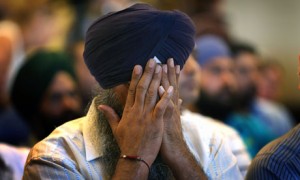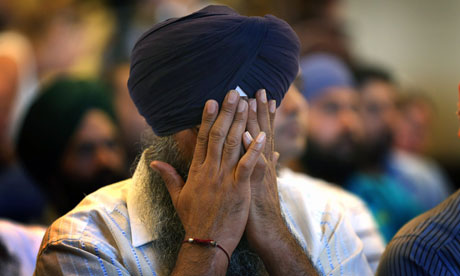
New York, Aug 6: Sikhs in New York and across the country on Monday mourned the deaths in the shooting rampage at one of their temples outside Milwaukee, and some said the killings revived bitter memories of the period just after the Sept. 11 attacks when their distinctive turbans and beards seemed to trigger harassment and violence by people who wrongly assumed that they were militant Muslims.
Nancy Powell, the American ambassador to India, where the vast majority of the world’s 25 million Sikhs live, visited a temple in New Delhi and expressed horror and solidarity. Elsewhere, Sikhs reflected on the uncomfortable fact that because their appearance sets them apart, they are sometimes mistakenly singled out as targets. Observant Sikh men often wear turbans and do not cut their hair or shave their beards.
“I have been called Osama bin Laden walking down the street, because in the popular imagination a turban is associated with bin Laden and Al Qaeda,” said Prabhjot Singh, who works in the high-tech industry near San Francisco. “But 99 percent of the people who wear turbans in the United States are Sikhs, so they face a disproportionate number of acts of discrimination.”
In collecting data about post-Sept. 11 hate crimes, the Justice Department does not draw a distinction between Sikhs and Muslims, an entirely separate religion. A report from October says, “In the first six years after 9/11, the department investigated more than 800 incidents involving violence, threats, vandalism and arson against persons perceived to be Muslim or Sikh, or of Arab, Middle Eastern or South Asian origin.”
Sikhism, a monotheistic faith that emerged from the Punjab region of India about 500 years ago, is one of the world’s youngest major religions. It emphasizes self-reliance and individual responsibility and draws its tenets from the words of 10 gurus. The last guru, named Singh, as are many Sikhs today, died in 1708.
More than many other religious practitioners, Sikh men wear a uniform: unshorn hair and a small comb covered by a turban; a steel bracelet; and, for a certain group of initiates, a sword known as a kirpan.
The religion is known for promoting women to positions of power, and has championed social justice.
British colonialists in India tended to favor the Sikhs, viewing them as more Western than the Hindus and Muslims, who made up the vast majority of the population there.
“Historically in India there has been tension between the Sikhs and the ruling elite, whether Muslim or Hindu,” said Harpreet Singh, a Sikh who is finishing a doctorate in South Asian religions at Harvard and helped found the Sikh Coalition in 2001 to help Sikhs stand up for their rights. “The gurus didn’t want to pay the non-Muslim tax. Sikhs grew in numbers and became a political force.”
The prime minister of India, Manmohan Singh, is a Sikh from Punjab, and on Monday he expressed sorrow and condemnation for the killings of six people at a Wisconsin temple on Sunday by a man who appeared to have ties to a white supremacist movement. The gunman was killed by the police.
Other recent acts of violence against Sikhs — the defacing in February of a temple in Michigan, the beating of a cabdriver in California in late 2010 — involved mistaken references to Al Qaeda or militant Islam. The first post-Sept. 11 killing classified as a hate crime took place in Arizona, where a Sikh was gunned down by a man who is now serving a life sentence.
In the Jackson Heights section of Queens on Monday, Sikh men in russet, black and peach-colored turbans swept leaves from the fronts of stores selling saris and gold jewelry, and offered discounts to passers-by. Many talked about the Wisconsin rampage.
“Very sad. I was shocked,” said Harbinder Singh, who works at a grocery. “We have not done any harm to anyone. Why are we targeted? Maybe some other religions have done harm. They think that we are the same. Maybe that’s the reason.”
Inder Mohan Singh, 73, who owns a Western Union location, lives in Woodbury on Long Island and has been in the United States for 40 years.
“I’m just an ordinary man, just like other people, just like other Americans,” he said. “I should cut my hair? No one is going to change. I’m wearing the turban. I have to do it. I don’t want to say, ‘No, now I’m not going to wear my turban because of this man.’ ”
He added: “This is our religion. We cannot leave our religion for one man.”

